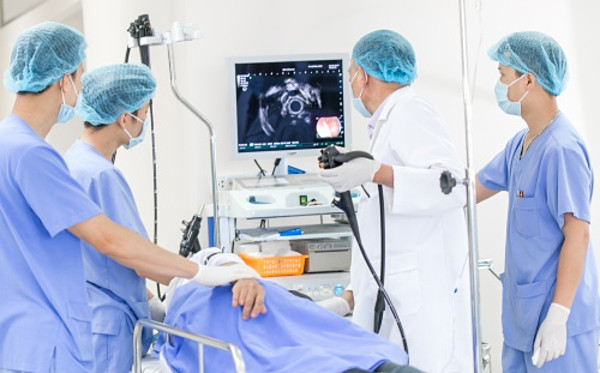Risk of infection when performing endoscopy on hundreds of patients a day
Depending on the type of digestive endoscopy, the patient can be infected with HP bacteria, hepatitis virus, typhoid...
Sharing at the Gastrointestinal Endoscopy Infection Control Conference on March 23, Dr. Vu Truong Khanh, Head of the Gastroenterology Department, Bach Mai Hospital, said that endoscopy is the only method to detect and diagnose diseases of the digestive tract such as lesions and cancer of the esophagus, stomach, colon, etc.
The Gastroenterology Department of Bach Mai Hospital performs an average of 300 to 400 endoscopy patients per day. In 2018, the department performed 12,836 colonoscopies and 52,299 gastroscopies. With a large number of patients, disinfection and sterilization of the endoscope and endoscope instruments are very important. Poor infection control can cause the risk of infection from one person to another.
"When performing upper gastrointestinal endoscopy, patients are at risk of being infected with HP bacteria; can be infected with both HP and hepatitis virus when performing pancreaticobiliary endoscopy; when performing lower gastrointestinal endoscopy, there are cases of typhoid infection...", Dr. Khanh said.
|
Endoscopy is the only method to diagnose and detect diseases of the digestive tract. |
Dr. Truong Anh Thu, Deputy Head of the Infection Control Department, Bach Mai Hospital, shared that endoscopes commonly used in digestive departments are instruments with complex configurations, contaminated with many body fluids after use, and difficult to clean. This is a favorable condition for microorganisms to easily multiply, creating biofilms that prevent chemicals and disinfectants/sterilizers from taking effect.
"To achieve optimal effectiveness in disinfecting and sterilizing endoscopic instruments, it is necessary to combine safe practices, chemicals and appropriate disinfection equipment," said Dr. Thu.
According to nurse Pham Van Phuc, currently, infection control in gastrointestinal endoscopy is still facing many difficulties. Human resources for disinfection are not focused on, and training courses on infection control in endoscopy are few. The disinfection area is not separate from the endoscopy room. The number of endoscopes and automatic washing machines is limited, depending on manual washing methods.
Nurse Phuc suggested that to reduce infections from digestive endoscopy, in addition to training technicians and monitoring infections, it is important to apply information technology to support the management of drugs and digestive supplies...


